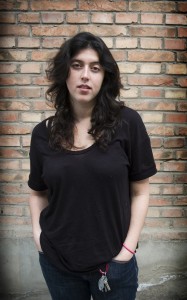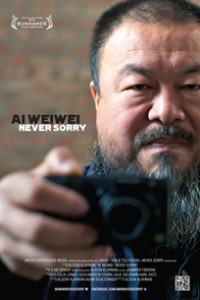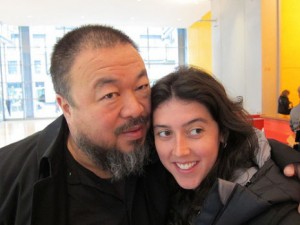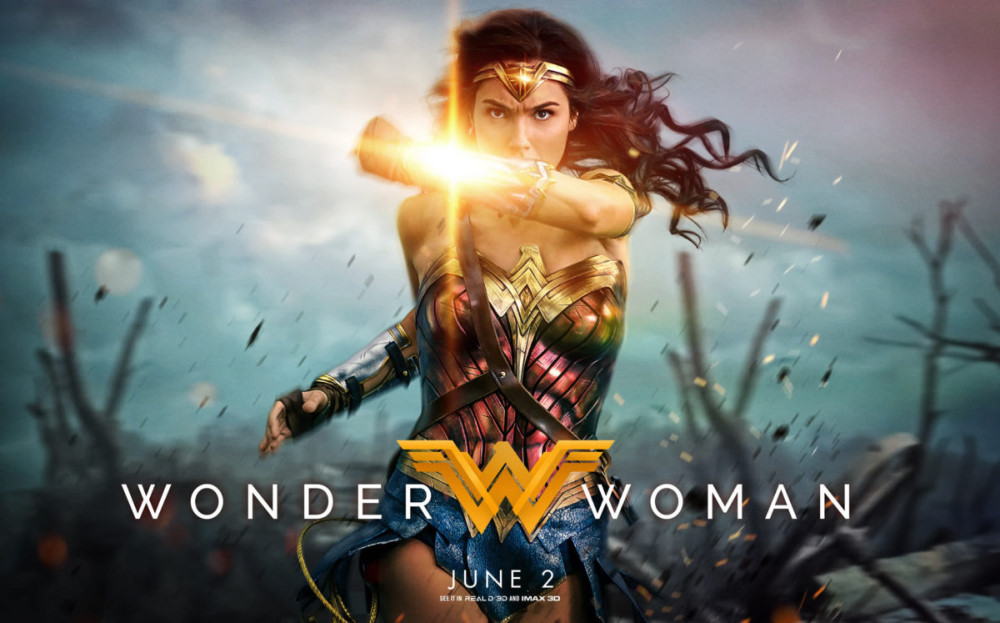 A 2006 graduate from Brown University, Alison Klayman is a documentary filmmaker and a freelance journalist. After graduating college she went to China where she spent four years producing radio and television stories for NPR’s “All Things Considered,” Associated Press Television, Voice of America, Current TV, and CBC. She reported the story “Who’s Afraid of Ai Weiwei?” for PBS’ “Frontline” and currently completed her first feature documentary film, “Ai Weiwei: Never Sorry.” Her documentary short, entitled “Ai Weiwei: New York Photographs 1983-1993,” was shown as part of the artist’s exhibition at the Three Shadows Photography Art Centre in Beijing from January through April of 2009. She also adapted a shorter version for the Tate Modern’s online channel. Ms. Klayman recent sat down with Media Mikes to talk about her film and the inspiration she draws from it’s subject.
A 2006 graduate from Brown University, Alison Klayman is a documentary filmmaker and a freelance journalist. After graduating college she went to China where she spent four years producing radio and television stories for NPR’s “All Things Considered,” Associated Press Television, Voice of America, Current TV, and CBC. She reported the story “Who’s Afraid of Ai Weiwei?” for PBS’ “Frontline” and currently completed her first feature documentary film, “Ai Weiwei: Never Sorry.” Her documentary short, entitled “Ai Weiwei: New York Photographs 1983-1993,” was shown as part of the artist’s exhibition at the Three Shadows Photography Art Centre in Beijing from January through April of 2009. She also adapted a shorter version for the Tate Modern’s online channel. Ms. Klayman recent sat down with Media Mikes to talk about her film and the inspiration she draws from it’s subject.
Mike Smith: What was your inspiration to make this film?
Alison Klayman: I had been in China for a couple of years. And the reason I went… after I graduated from college, my goal was to make a documentary film. And in meeting Ai Weiwei I knew I had found a character who was not only very charismatic and complicated but, after our initial meeting together, I felt he could expand my ideas about China. I thought that an audience would enjoy watching him.
MS: You worked in China for several years. What brought you there?
AK: What brought me to China was a desire to go abroad…have adventures…become a journalist and do foreign correspondence work. The reason I went to China was very random. I had a friend who had family there. I went on a trip with her and ended up staying. I just wanted to go abroad…to anywhere in the world. I ended up in China. But I really threw myself into it. I worked in a lot of different industries. My dream was to one day feel like I deserved to make a documentary film. And in Ai Weiwei I found a great subject.
MS: How did you come to meet Ai Weiwei?
AK: Another story that’s more random than anything else. My roommate at the time in Beijing was working for a local art gallery and she was curating an exhibition of Ai Weiwei’s photographs from the decade that he lived in New York. How I actually initially heard of Ai Weiwei was though these photographs. And in 2008 she said to me that she thought it would be nice to have a video to accompany the gallery show. Something to show in the lobby that offered a deeper story to some of the photos. She asked if I wanted to make it and I said “yes.” In December 2008 I was brought over to Weiwei’s studio along with the gallery team. And on the first day we met I already had my camera in hand. And I started filming right away. I was so lucky that I had this introduction and was given this great opportunity.
MS: This is kind of a two part question. Until he’s detained by the Chinese government you seem to have almost total access to him. Were you able to communicate with him once he had been detained? Also, because of your association with this project, did you have any fear for your safety while in China?
AK: Nobody was really able to be in touch with him during his detention. His wife was brought to visit him once. She was the only person to see him during those 81 days, apart from those who were guarding him. She wasn’t told the location where she met with him and she was only allowed to be with him for 20 minutes. And during his detention I was in very close touch with people at the studio. I was very active on social media…giving interviews on what was happening. I was able to meet with him about two months after his release in Beijing. That was very important because we showed him the film before we headed out to Sundance. As to my safety…it was a good thing that I was already used to living in China and doing work as a journalist. I know there are certain ways to behave so that you won’t necessarily run into trouble. So on the whole, I did not fear for my safety. I did fear for the safety of Ai Weiwei and the other citizens who were engaged in his work. There were the ones that were really taking the serious risks. For me there were a few scary moments during filming, particularly when Weiwei was heading towards the police stations and the court houses. I was along for the ride, one of many cameras. I think when you watch you can see those moments and see  that we didn’t know how they played out. Those were the only experiences where I experienced any interference from the authorities….trying to take the camera…trying to take the tapes.
that we didn’t know how they played out. Those were the only experiences where I experienced any interference from the authorities….trying to take the camera…trying to take the tapes.
MS: Due to the rather unflattering light that you shine on the Chinese government would you ever return to China?
AK: Definitely. I really hope to do more work there. I’m hoping that life will take me there again.
MS: Do you still communicate with Weiwei?
AK: The best way we talk is very open through Twitter. And what’s great is that he often re-tweets my posts, like, “just saw the film in Europe at a film festival.” He re-tweets that and I know he was able to see where the film had been shown. That’s the main way we stay in touch. We do also text and occasionally will talk on the phone, though it’s not necessarily safe to talk on the phone. I last talked to him about two weeks ago and he was blown away by the reach and the impact the film was having.
MS: Have you decided on your next project yet?
AK: I wish! I’m just developing ideas…not sure if they’re ideas for short films or a series of films. I’m coming off a really exciting project. I had a healthy respect for documentaries in college and I’m constantly curious and fascinated by their stories. I want to find another story that makes me feel the same way.

